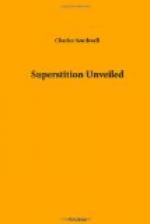This is the system and this is the schoolmastership expressly sanctioned by the Bishops of London and Chester. In piety nevertheless those prelates are not found wanting. They may starve the bodies but no one can charge them with neglecting the souls of our ’independent labourers.’ Nothing can exceed their anxiety to feed and clothe the spiritually destitute. They raise their mitred fronts, even in palaces, to proclaim and lament over the spiritual destitution which so extensively prevails—but they seldom condescend to notice physical destitution. When the cry of famine rings throughout the land they coolly recommend rapid church extension, thus literally offering stones to those who ask them for bread. To got the substantial and give the spiritual is their practical Christianity. To spiritualise the poor into contentment with the ‘nourishing broth’ from thrice boiled bones, and to die of hunger rather than demand relief, are their darling objects.
Did Universalists thus act, did they perpetrate, connive at, or tolerate such atrocities as were brought to light during the Andover inquiry, such cold blooded heartlessness would at once be laid to the account of their principles. Oh yes, Christians are forward to judge of every tree by its fruit, except the tree called Christianity.
The vices of the universalist they ascribe to his creed. The vices of the Christian to anything but his creed. Let professors of Christianity be convicted of gross criminality, and lo its apologists say such professors are not Christian. Let fanatical Christians commit excesses which admit not of open justification, and the apologist of Christianity coolly assures us such conduct is mere rust on the body of his religion—moss which grows on the stock of his piety.
From age to age the wisest among men have abhorred and denounced superstition. It is true that only a small section of them treated religion as if necessarily superstition, or went quite as far as John Adams, who said, this would be the best of all possible worlds if there were no religion in it. But an attentive reading of ancient and modern philosophical books has satisfied the author that through all recorded time, religion has been tolerated rather than loved by great thinkers, who had will, but not power to wage successful war upon it. Gibbon speaks of Pagan priests who, ’under sacerdotal robes, concealed the heart of an Atheist.’ Now, these priests were also the philosophers of Rome, and it is not impossible that some modern philosophical priests, like their Pagan prototypes, secretly despise the religion they openly profess. Avarice, and lust of power, are potent underminers of human virtue. The mighty genius of Bacon was not proof against then, and he who deserves to occupy a place among ’the wisest and greatest’ has been ‘damned to eternal fame’ as the ’meanest of mankind.’
Nor are avarice and lust of power the only base passions under the influence of which men, great in intellect, have given the lie to their own convictions, by calling that religion which they knew to be rank superstition. Fear of punishment for writing truth is the grand cause why their books contain so little of it. If Bacon had openly treated Christianity as mere superstition, will any one say that his life would have been worth twenty-four hours’ purchase?




